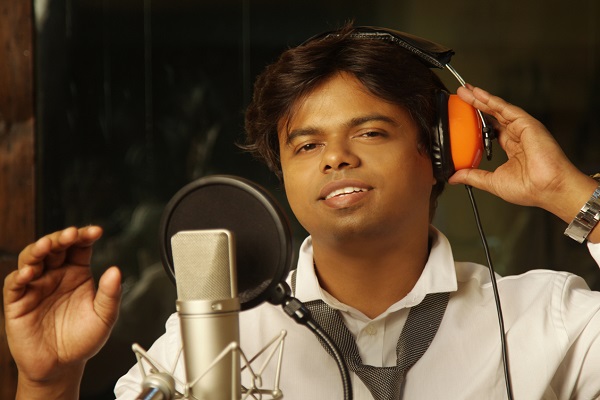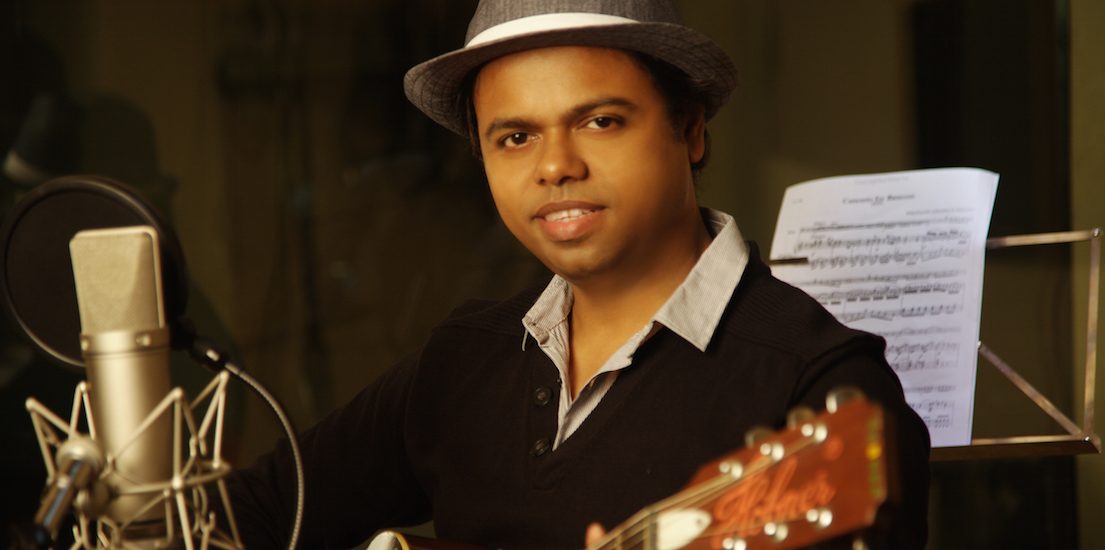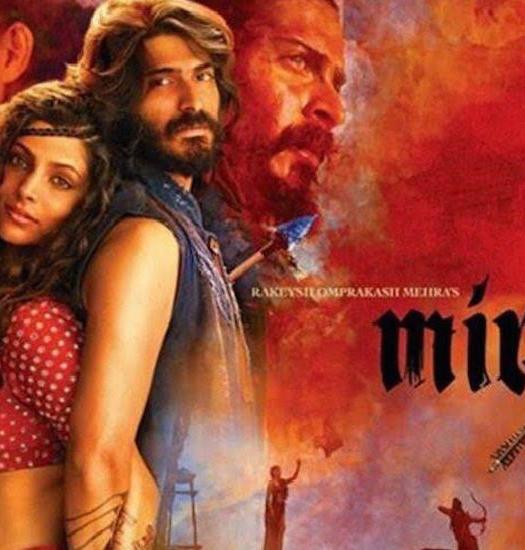Bollywood was never my goal – Krsna Solo
With his debut film ‘Tanu Weds Manu’, Krsna Solo made an impactful entry into the Indian music industry. A versatile music composer, playback singer, and songwriter, he has created foot-tapping numbers for movies like Tanu Weds Manu, Jolly LLB, Tanu Weds Manu Returns and more. Krsna has also widened his musical horizons and gone beyond Bollywood with the BBC Documentary called India’s Daughter. He aspires to explore the global space further and has taken the first steps in this direction by establishing his own label called Panoctave Music. With a brand new label and some amazing music to look forward to, Krsna is here to stay for the long haul.

Music Composer Krsna Solo
What influenced you to pursue a career in music?
I got attracted to music when I was 12 or 13 years old. My first thought was that music is so pleasurable. During school times, I attempted to do something in music and would participate in various competitions. The composition part really got to me and I wanted to create music. I started listening to all kinds of artists and started making songs of my own. It took me a while, but in a month or two, I came up with my first song, which I sang on the school stage. I felt utmost pleasure in creating a melody out of nowhere. I did not have any formal training then, so it was my own perception that was transcribed into sound, vocals, and words. I have always felt that I can express better with music. I can say anything I want and that was my driving force.
READ: WE DECIDED TO MAKE A PUNJABI SONG THAT ISN’T PUNJABI – VAYU
How did you start your journey in Bollywood and how has it been so far?
Bollywood was never my goal. I did not imagine myself to be a composer. It was always about being a singer and a songwriter. I used to be a vocalist; in fact, I had a band, where I was the lead vocalist and songwriter. When I came to Mumbai I thought that I would have my own albums. But by the time I came to Mumbai, the music scenario had completed changed. Creating your own album did not exist anymore; it was all about film music. Whenever I thought about an artist, whether it was Lucky Ali or Michael Jackson or Alisha Chinai, they were solo artists. They had their own style and their own songs and I thought that I would do the same, once I became a musician. I had come here to do that but by then the concept of solo albums had completely dried out.
Suddenly my whole direction and focus shifted. I realized that I needed to learn the complete form of music. Getting into films is a different ball game altogether because you are creating music for someone else. That is when I underwent formal training and learned Indian and Western classical music in a proper manner. I trained under Ustad Mehmood Khan. Moreover, after coming to Mumbai, my mentor and godfather, Jawahar Chavda has been instrumental in shaping my musicianship, guiding and supporting me throughout my musical journey, to become what I am today.
In 2-3 years when I felt confident, I started meeting producers and filmmakers. I think in the first fifteen days I met Aanand L Rai and he offered me a song in Tanu Weds Manu. It was one of the difficult songs and was called ‘Mannu Bhaiya’. Through the song, I could deliver what I had learned and how I perceived his vision of the film. He liked my work and without asking about my previous experience, he gave me the responsibility of the entire film along with the background score. It was like having your dream turn into a reality, which has been great!
I have always felt that I can express better with music.
Tell us about the experience of your debut film Tanu Weds Manu.
I think that was one of the best experiences ever. I have always dreamt of being a musician and coming from a non-musical background, I had a burning ambition that whatever I do, needs to lead to music. I got through IIT, but gave that up and got into a design college thinking that it could take me closer to music. I purposefully chose filmmaking because it was the only link to music. Then I started doing advertising and started making audiovisuals. Ads are like mini-scale films and I have learned the tricks of the trade from there – production, mixing, recording etc. It was a huge jump for a novice musician to get a solo film. It was not like I was delivering a single, I got the chance to do the whole film and the score too. It took us two and half years to make the film.
I am happy that I chose the right project and have put my heart into it. There were a lot of hiccups in the film as it got stuck in the middle when Kangana Ranaut met with an accident and broke her leg. There were many highs and lows and we didn’t know if the film would ever get made. And, then suddenly the film got support from Viacom 18. After two years of hard work, seeing the film on the big screen was a joyous moment. It was a long, emotional and unbelievable journey for me.
READ: I THINK MY ABILITIES AS AN ARTISTS RE AT VERY PRIMITIVE LEVELS – KANGANA RANAUT

Winning the Filmfare award
With the music of Tanu Weds Manu being such a huge hit, how did you then approach Tanu Weds Manu Returns?
I look at things from a fresh perspective and forget what was done in the past. We couldn’t do the exact same kind of music because you cannot recreate something once its already done. There has to be a difference in it but since it was a sequel, it had to have some similarities too. So we looked at what the film needed. The times have changed since the first film and so have the people. Today, people are more recipient to different kinds of music. So I tried a jazz song and even tried a hip-hop fusion in the film. Music today is just evolving.
I want to encourage a lot of independent music through my record label
From mainstream movies like Tanu Weds Manu, how did you get into the documentary/independent space with India’s Daughter or Oonga?
I have always thought globally and I think that I am capable of doing different kinds of music. Bollywood has a particular kind of music. If I want to compose an orchestral symphony, not many films will give me that scope and even if they do, it will be very limited. I have grown up with a lot of western music. But my debut was so Indian that people think that this is the only kind of music I do. I just want to diversify, which is why I did a BBC documentary where the music has a different feel altogether. I keep scouting for and reaching out to international projects as well. I am working on some international albums right now and I am also doing an R&B album. Bollywood music is not the only thing in life; there are different kinds of music. I have started a record label called “Panoctave Music” and have launched two songs under the label, which are on YouTube. Through the label, I want to encourage a lot of independent music.
READ: OONGA EXPLORES A COLLISION OF CULTURES – DEVASHISH MAKHIJA
You are also a songwriter and playback singer. Is that something that you are keen on pursuing in the future?
I always wanted to be a singer, but I am establishing myself as a composer first. I have sung two songs and now you will hear me singing more. This year, there are two films in which I will be singing. There is a dance number that I have sung in a movie that will release around May-June. I think this is the time to sing in my own voice as people know and trust me. Moreover, I have written and sung a song called ‘Tu Jo Paas Mere’ under my own label as well. You will hear a lot of my old music that I have written in the future.
A R Rahman has been an epitome of everything music
When it comes to inspirations, which national and international musicians have influenced you?
I am heavily inspired by Michael Jackson. He has been the biggest inspiration for me to get into music and I have learnt a lot from his music. Then of course there is A R Rahman who has been an epitome of everything music. Also, living in Kolkata you cannot not be influenced by R D Burman. I have always found him to be so versatile; every melody of his is so catchy. Today, I look at so many known and unknown artists just to learn from everyone. The Internet is an inspiring medium where you get to follow different artists and look into all kinds of music.


